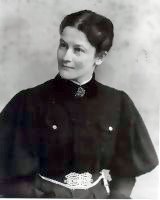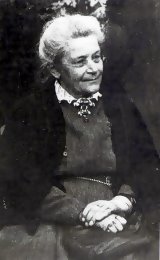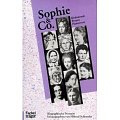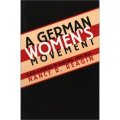Fembio Specials Famous Women from Hanover, Germany Agnes Hundoegger
Fembio Special: Famous Women from Hanover, Germany
Agnes Hundoegger

Born 26 February 1858 in Hanover
Died 23 February 1927 in Hanover
Music educator and founder of the Tonika-Do (movable doh, Tonic Sol-Fa) method in Germany
Biography • Weblinks • Literature & Sources
Biography
Agnes Hundoegger’s contributions seem almost forgotten today, for except for Eva Rieger’s in-depth article in Sophie & Co very little has been written about the Hanover native. Hundoegger’s father was head physician and medical director of the Hanover City Hospital, and as a man of integrity and beloved friend to many, he was an important model for her. The Hundoegger children grew up in an atmosphere of culture and musical openness; Agnes’ musical talent was soon recognized and fostered from an early age. When she was 16 her parents sent her to Berlin to study music. She studied voice with Elise Breiderhoff and piano with Ernst Rudorff. In 1881 she concluded her studies with special recognition in both areas and went on to continue her work in voice under Julius Stockhausen in Frankfurt.
Back in Hanover Hundoegger concertized as a pianist and voice soloist (oratorios and Lieder). In addition she gave lessons in voice and piano, and was soon struck by the lack of an effective method of training the ability to hear musical intervals. She noticed that her pupils had difficulty writing down the melodies and harmonies they heard, and began to search for a suitable method of teaching and learning.
In the spring of 1896 friends brought her from England various textbooks in the Tonic Sol-Fa method, a method of teaching vocal music invented by Sarah Ann Glover of Norwich about 1812, based on the MOVABLE DO system and using the syllables Doh, Ray, Me, Fah, Soh, and Lah adapted from the Guidonian alphabet (with Te added for the leading tone). (From Baker’s Student Encyclopedia of Music). Hundoegger studied the manuals carefully and was convinced by the simplicity and logic of the system. She decided to attend a vacation-course given by the T. S. F. Society in a small London suburb that same year.
She returned to Hanover overwhelmed by her impressions and immediately began to apply what she had learned.

Her success with the new method motivated her to translate the textbook of J. Spencer Curwen, Jr., to make it available for German music teachers. She supplemented the translation with an introduction to musical notation and modified the notation of the syllables, the rhythmic notations and some hand motions. A year after her visit in London Hundoegger published her Leitfaden der Tonika Do-Lehre (Guide to Tonika Do Methodology) at her own cost. To promulgate the new method, she offered courses and gave lectures in various cities. In 1909 she founded the Tonika-Do-Bund e.V. (Tonika-Do League) and the Tonika-Do-Verlag (publishing house) in Hannover to institutionalize the methodology, and developed testing materials to prevent its being inaccurately imparted. The Tonika-Do League experienced its first public success in spring 1921 with its participation in the School Music Week organized by the Zentral-Institut für Erziehungs- und Unterrichtswesen (Central Institute for Education and Teaching) in Berlin.
But although Hundoegger’s Leitfaden was intended explicitly for use in schools, the method was strongly resisted by elementary school teachers. The male teachers supported the number-method (Ziffernmethode) of their colleague Carl Eitz. Hundoegger sensed that the resistance against T. D. was based on a resistance against her as a woman. Even in the 1920’s the female supporters of the T.D. method faced a strong headwind because of their gender.
As an educator Hundoegger was highly appreciated by her students. They were enraptured by her great musicality and her humanity. Hundoegger died on 23 February 1927 and was buried in Hanover’s Engesohde Cemetery.
(trans. Joey Horsley)
Author: Karina Seefeldt
Links
1 Becker, Andreas: Albert Greiner und die Augsburger Singschule. Dissertation (PDF-Datei).
2 Fromm, Michael: Über relative Solmisation. Musik in der Schule.
3 Google Buchsuche: Agnes Hundoegger.
4 Grunenberg, Manfred: Zur Geschichte der relativen Solmisation. Chorforum Essen.
5 Phleps, Thomas: Die richtige Methode. Anmerkungen zur Funktion und zum Funktionieren von Solmisationssilben und ihren Produzenten in der ersten Hälfte des 20. Jahrhunderts.
Links last checked 20 June 2008 (AN)
Literature & Sources
Hundoegger, Agnes (1897): Leifaden der Tonika-Do-Methode für den Schulgebrauch. Hannover. Tonika-Do-Bund. (Suchen bei Eurobuch | WorldCat)
Hundoegger, Agnes. (1925): 100 Kanons für die sangesfreudige Jugend in Noten und Tonika-Do-Schrift. Hannover. Tonika-Do-Verlag. (Suchen bei Eurobuch | WorldCat)
Hundoegger, Agnes (1926): Übungsbuch zum Leitfaden der Tonika-Do-Lehre. Hannover. Tonika-Do-Bund.
Hundoegger, Agnes. (1927): Alte, altmodige und neuere ein- und zweistimmige Lieder. Hannover. Tonika-Do-Bund (Ergänzungsheft zum Übungsbuch zum Leitfaden der Tonika-Do-Lehre). (Suchen bei WorldCat)
Hundoegger, Agnes (1927): Tonika Do Quartettspiel. Hannover. Tonika-Do-Verlag. (Suchen bei WorldCat)
Hundoegger, Agnes (1934): Ubungen zum Vomblattsingen für Schulen, Singgruppen, Chöre und Musikseminare. Berlin. Tonika-Do-Verlag. (Suchen bei WorldCat)
Hundoegger, Agnes (1967): Lehrweise nach Tonika Do. Neubearbeitung des Leitfadens von Elisabeth Noack. Köln. Kistner u. Siegel – Abteilung Tonika-Do-Verlag. ISBN 3-920541-10-3. (Suchen bei WorldCat)
Hundoegger, Agnes (1925): Brief an Marianne Oehmigen. Hannover. Institut für Musikpädagogische Forschung (Nachlass Agnes Hundoegger).
Hundoegger, Agnes (1926): Die Tonika-Do-Lehre in Deutschland. In: Die Musikerziehung.
Hundoegger, Agnes (o. J.): Die Tonika-Do Lehre in Kindergarten und Grundschule. In: Tonika-Do-Bund e.V. Hannover. Institut für Musikpädagogische Forschung (Nachlass Agnes Hundoegger).
Ritter, Agnes (1995): Erinnerungen an Agnes Hundoegger (1858-1927). Handschriftlich mit Foto. Hannover. Institut für Musikpädagogische Forschung (Nachlass Agnes Hundoegger).
Schroeder, Hiltrud (Hg.) (1990): Sophie & Co. Bedeutende Frauen Hannovers. Biographische Portraits. Darin: Agnes Hundoegger (1858-1927). »Die Heimatstadt verschloß sich ihren Ideen« von Eva Rieger. Hannover. Fackelträger. ISBN 3771615216. (Suchen bei Amazon | Eurobuch | WorldCat)
Reagin, Nancy Ruth (1995): A German women's movement. Class and gender in Hanover. 1880 – 1933. Chapel Hill. University of North Carolina Press. ISBN 0-8078-2210-8. (Suchen bei Amazon | Eurobuch | WorldCat)
If you hold the rights to one or more of the images on this page and object to its/their appearance here, please contact Fembio.









